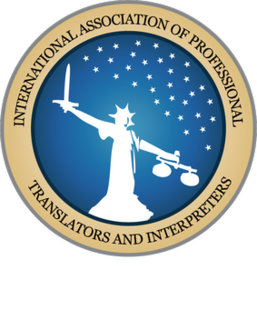Interpreting is a translational activity in which one produces a first and final translation on the basis of a one-time exposure to an expression in a source language.
The American Translators Association (ATA) was founded in 1959 and is now the largest professional association of translators and interpreters in the United States with more than 10,000 members in 90 countries.
The Association of Welsh Translators and Interpreters is a professional body representing English/Welsh translators and interpreters in Wales. The association has some 340 members, most of whom are translators; less than a quarter are interpreters. The Association of Welsh Translators and Interpreters is a member of the International Federation of Translators (FIT).
The National Accreditation Authority for Translators and Interpreters Ltd is the national standards and accreditation body for translators and interpreters in Australia. NAATI's mission, as outlined in the NAATI Constitution, is to set and maintain high national standards in translating and interpreting to enable the existence of a pool of accredited translators and interpreters responsive to the changing needs and demography of the Australian community. The core focus of the company is issuing credentials for practitioners who wish to work as translators and interpreters in Australia.
Translating for legal equivalence is the production of translations that are acceptable by a legal jurisdiction.

Bill Trinen is the Senior Product Marketing Manager of Nintendo of America. He is also a professional Japanese-to-English translator who has worked on the localization of numerous Nintendo-published video games and often acts as an interpreter for various Japanese developers, most notably video game designer Shigeru Miyamoto.
A language bank is an organization that helps people who need translation or interpretation services fulfill those needs through the assistance of qualified translators or interpreters. Such organizations usually, but not always, provide such services free of charge, often as a service of local government. Language banks often service immigrant or refugee communities, often in collaboration with health service providers such as the American Red Cross.
A translator or programming language processor is a compiler for converting a program written in the source language into a program in a different programming language that is functionally equivalent. This is without losing the functional or logical structure of the original program. These include translations between high-level and human-readable computer languages such as C++ and Java, intermediate-level languages such as Java bytecode, low-level languages such as the assembly language and machine code, and between similar levels of language on different computing platforms, as well as from any of these to any other of these. The term is also used for translators between software implementations and hardware/ASIC microchip implementations of the same program, and from software descriptions of a microchip to the logic gates needed to build it.
Translation is the communication of the meaning of a source-language text by means of an equivalent target-language text. The English language draws a terminological distinction between translating and interpreting ; under this distinction, translation can begin only after the appearance of writing within a language community.

International Translation Day is celebrated every year on 30 September on the feast of St. Jerome, the Bible translator who is considered the patron saint of translators. The celebrations have been promoted by International Federation of Translators (FIT) ever since it was set up in 1953. In 1991 FIT launched the idea of an officially recognized International Translation Day to show solidarity of the worldwide translation community in an effort to promote the translation profession in different countries. This is an opportunity to display pride in a profession that is becoming increasingly essential in the era of progressing globalization.
The Allied Translator and Interpreter Section (ATIS), also known as the Allied Translator and Interpreter Service or Allied Translator and Intelligence Service, was a joint Australian/American World War II intelligence agency which served as a centralized allied intelligence unit for the translation of intercepted Japanese communications, interrogations and negotiations in the Pacific Theater of Operations between September 1942 – December 1945. During the last few months of operation ATIS primarily focused on investigation of Japanese war crimes. The section was officially disbanded on April 30, 1946.

The International Association of Professional Translators and Interpreters (IAPTI) is an international professional association of translators and interpreters based in Argentina.

Today Translations is a global translations services agency, headquartered in the City of London. The company was founded by Jurga Zilinskiene in 2001, and has developed into international agency with multiple locations and over 3,000 staff, providing translation, interpreting, consulting, localisation, voiceover, subtitling and more in over 200 languages. The firm uses database software Zilinskiene designed and evolved from the start of the business.

Jurga Zilinskiene is an entrepreneur, programmer and founder of Today Translations, a global translation company.
Nora Pavlovna Chegodayeva was a Soviet interpreter and translator. A Red Army officer during World War II, she was one of the organizers of a women's sniper course that became famous after its later reorganization as the Central Women’s Sniper Training School.
The Translators Association of China (TAC) is a national association for translation studies in China. Founded in the 1980s TAC was part of the academic response to the national Economic Reform in 1978. The incumbent President of TAC's 6th Executive Committee is the former Chinese Foreign Minister Li Zhaoxing, who in the meantime chairs the Foreign Affairs Committee of China.

The Associació Professional de Traductors i Intèrprets de Catalunya (APTIC) is an independent, non-profit association. It was officially established on January 1, 2009, and is open to all professionals from the sector who are academically trained or professionally active. APTIC is a member of the International Federation of Translators (FIT) and the Red Vértice. With over 650 members, APTIC has over twenty years’ experience representing and defending translators and interpreters. It also organizes training and promotional activities for the sector’s professionals.
Antonfrancesco Vivarelli Colonna is an Italian politician.






